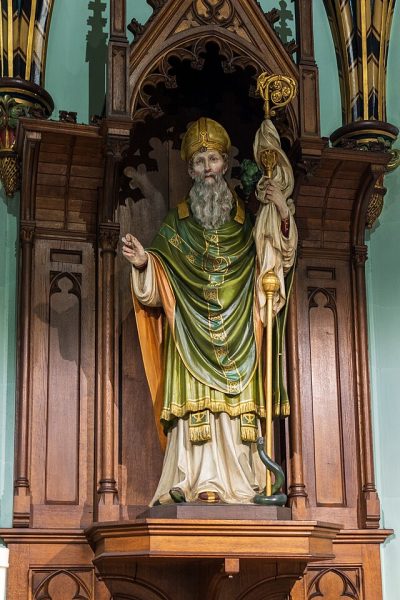Religions of North Forsyth: Knowledge is a Justified True Belief
Religion is a building block of life for an immense amount of people. It is the sole core of their being and they center everything else around it. It is their lifestyle. Because of this, I have made it my lifestyle to explore every religion. In my studies, I have learned that there is no one specific definition of religion. All religions are individual to each person, even when they are not religious. Unfortunately, there are many assumptions and little knowledge when it comes to the religions of others. This happens far too much, especially when religions that most are not familiar with have quite a lot of similarities to Christianity, the most well-known religion in the United States. My goal is to clear up as many of those misconceptions as I can, both in my life and in anyone else’s, by learning about many different religions.
“A” means “without”1 and “gnosis” means “knowledge.”2 Therefore, Agnostic means without knowledge, usually in reference to God or gods. Sophomore Emily Day does not claim to be a believer or a non-believer, but an Agnostic. Agnosticism may not be considered a religion, and yet it is not a lack-of a religious belief either. It is a philosophy, but interesting enough to be looked into because it is considered by many to be an alternative to religion. Often, people think that it is an alternative to Atheism, but that is a common misconception. Agnosticism has nothing to do with what people believe, but rather it has to do with distinct and definable knowledge. Day shared how she thought deeply about the religion of her parents before having a realization that it cannot be proven, but neither can it be disproven. It is different because instead of saying “God exists” with conviction, or vice-versa, the whole concept revolves around uncertainty.
Depending on details, like culture or how they were raised, Agnostics choose to celebrate whatever holidays they want. For Day, Christmas and general British holidays are the ones she grew up celebrating. As far as their daily life, it is just like the life of anyone else; it is a daily routine with abstract thought, complications, and happiness dotted throughout. When it comes to religion or the absence of it, one believes that God either exists or they believe He does not. However, if an Agnostic said what they think life is about, it goes beyond any written definition. Every single answer is different because some are theists and some are atheists. “Happiness, and going by whatever will make you happy and whatever you feel is best for you…without bringing in other people’s views. It’s all happiness…” defines Day’s lifestyle. That is her base concept, while for someone else it may be knowledge for knowledge sake. Generally, to be an Agnostic means to have a personal philosophy about life without any definitive knowledge outside of oneself.
Hinduism is believed to be the oldest religion, “with no founder or known date of origin.”3 Even so, near everything I talked to senior Kajal Patel, and a born Hindu, about was very familiar; we had a lot more in common than I expected, similarly to Agnosticism. In the United States, the term Hinduism is used to regard a general religion that has many assumptions attached to it. Literally, it is “a collective term applied to the many philosophical and religious traditions native to India”4 but even as that may seem obscure, it is similar to Christianity, which also has many denominations. A lot of Hindus, but not all, worship multiple deities whom they believe interact with humans and influence the world. A widely accepted belief of Hindus’ is karma, or that “one’s actions (including one’s thoughts) directly determine one’s life, both one’s current life and one’s future lives.”4 That said, they also believe in rebirth.
Patel’s parents raised her with their morals and she was brought up around their religion, though she made it very clear that she chose Hinduism on her own. She is very interested in others’ beliefs, and she said that if she did something unapproved of, those around her would be “disappointed in me, and I would do my best to fix the situation and make up for it.” Just like Christians go to church every Sunday to pray and worship, Hindus go to a temple and pray to their gods. They form a relationship with the deities. This is done through Pujas, which is the word used for the formation of said relationship. Bhakti is part of Pujas and is when the individual treats the god with selfless love. This love is not one way, as it sounds; the deity also loves the devotee just as they love the deity. If the Temple is too far to travel to, they pray at home and spend hours in the morning dedicating themselves to worship and prayer.
A Hindu may celebrate an immense amount of holidays. Patel mentioned two holidays that her family celebrates: Diwali and Dhanteras. Dhanteras is celebrated right before Diwali, and is a worship of the Goddess Lakshmi to instill good fortune and success in life. “Diwali, also spelled Divali, one of the major religious festivals in Hinduism, [and lasts] for five days… The name is derived from the Sanskrit term ‘dipavali’ meaning ‘row of lights,’ which are lit on the new-moon night to bid the presence of Lakshmi, the goddess of wealth.”5
The Hindus have four main Holy Books of scripture. “The Vedas is a collection of hymns praising the Vedic gods. The Ramayana are long epic poems about Rama and Sita. The Mahabharata, which includes the Bhagavad Gita, is also an epic poem. And finally, the Puranas is a collection of stories about the different incarnations and the lives of saints.”6 Patel believes that her religious scriptures should not be taken word for word, but are instead to be guidelines for a holy, righteous, and good life.
Another misunderstood prominent religion is Jehovah’s Witnesses. It is, in many ways, similar to the denominations of Christianity that many Americans claim. Some similarities are that witnesses rely on the authority of the Bible, worship only one God, and trust in Jesus’ death and resurrection for salvation.7 There are also very prominent differences, though, like their rejection of the doctrine of the Trinity and the existence of Hell.7 Jehovah’s Witness’ also stress the End of Times much more than other denominations of Christianity.
Every day, Kayla Woodford and Perla Vazquez wake up and read their daily text, even on Christmas morning when most kids run for the Christmas tree with presents. This is because they do not celebrate any holiday except the “Memorial of Christ’s Death,” which occurs at roughly the same time as Christian Easter and the Jewish Passover. This holiday is acceptable because it was instituted by Christ himself.8 Woodford explained that they listen to a sermon on that day and said that they “celebrate what [Jesus] willingly did for us.” Christmas could be considered more so idolizing the cross or the birth of Christ instead of the man himself, and Thanksgiving’s symbol is a turkey, and regardless of any thanks given to God on that day, people are still focused on the food instead of solely God, which is why they are not celebrated.
Vazquez lives her life like she is “looking in a mirror. When you look in a mirror, you see all the little errors and try to put everything into place. When we make Jesus our mirror, we see our mistakes and sins; we do our best to make them right.” Their bodies are God’s temples, and they do their best to keep them clean, lovely, and to represent him with honor. They go to church to understand the Word of God, as well as attend classes to learn how to spread God’s Word kindly. There are usually three meetings a week; one on Sunday, and then two on weekday evenings, Wednesday being a popular day. Sunday is a day for worship, and the services begin and end with prayer and usually include some singing. Worship is simple and includes very little ritual.9 they do this to emphasize on Spirit and Truth rather than show. On the other two days, the Witnesses learn public speaking and discuss Evangelism, or “the winning or revival of personal commitments to Christ.”10 They work hard to show His grace to everyone that is open to it, but stop when they are asked to.
During my glimpses into different religions, I have seen numerous similarities between all of them, but I have also seen significant differences. Tolerance is a subject taken too lightly, still, and one thing that should be thought more highly of is the ability to accept wholly, and be curious about other religions. It is possible to be completely firm in one’s own religion while still being open to other religions, and I implore you to do just that, for yourself if for no one else. There are so many more religions to discover and appreciate. This is just the beginning.
______________
Works Cited
- “Prefix Dictionary – A.” Suffix Prefix Dictionary. McCarthy, Eugene M. 10 Nov. 2013. <http://www.macroevolution.net/biology-prefixes-a.html>
- “Gnostic.” Dictionary.com Unabridged. Random House, Inc. 10 Jan. 2014. <http://dictionary.reference.com/browse/gnostic>.
- “Hinduism.” ReligionFacts. Blue Host. 28 Nov. 2013. <http://www.religionfacts.com/hinduism/index.htm>
- “Religion Library: Hinduism.” Patheos. Avalon Consulting, LLC. 28 Nov. 2013. <http://www.patheos.com/Library/Hinduism.html>
- “Diwali.” Encyclopaedia Britannica. Encyclopaedia Britannica Online Academic Edition. Encyclopædia Britannica Inc., 2014. Web. 1 Dec. 2013.<http://www.britannica.com/EBchecked/topic/166786/Diwali>.
- “Hinduism – An introduction.” BBC Schools. BBC. 1 Dec. 2013.<http://www.bbc.co.uk/schools/religion/hinduism/>
- “Beliefs of Jehovah’s Witnesses.” ReligionFacts. Blue Host. 5 Dec. 2013.<http://www.religionfacts.com/jehovahs_witnesses/beliefs.htm>
- “Jehovah’s Witnesses and Holidays.” ReligionFacts. Blue Host. 5 Dec. 2013.<http://www.religionfacts.com/jehovahs_witnesses/holidays.htm>
- “Practices of Jehovah’s Witnesses.” ReligionFacts. Blue Host. 5 Dec. 2013.<http://www.religionfacts.com/jehovahs_witnesses/practices.htm>
- “Evangelism.” Merriam-Webster Dictionary. © 2014 Merriam-Webster, Incorporated. 10 Dec. 2013. <http://www.merriam-webster.com/dictionary/evangelism>

Rebekah Schnaubelt is a calm spirit, but by no means boring. Her brain is set to fast forward and even when her mouth can’t keep up with it, her pen...












